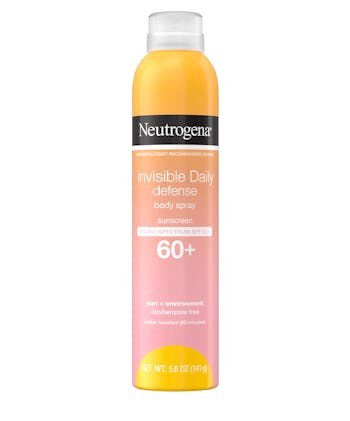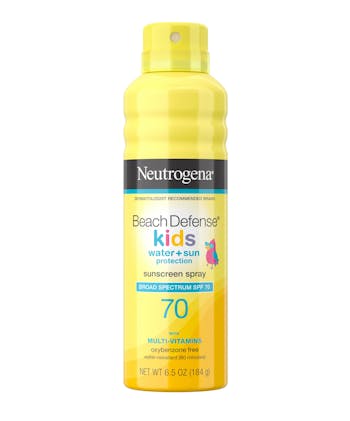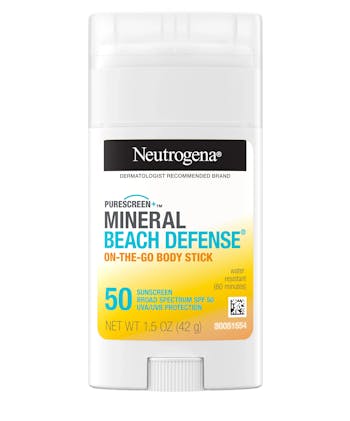It's no secret that sunscreen is the best way to protect your skin from ultraviolet (UV) damage. While your body needs some sun exposure to maintain healthy vitamin D levels, failing to (or forgetting to) protect your skin from the sun's rays can lead to all kinds of not-so-fun effects. But, aside from sunburn, why exactly should you care about shielding your skin from the sun? And what does sunscreen do?
Here's how to choose sunscreen that protects against both UVA and UVB rays, a breakdown of SPF and some of the most common myths about sunscreen safety.
How To Protect Yourself From the Sun
The sun is vital to how your body produces vitamin D, which helps it absorb calcium. Vitamin D deficiency can increase your risk of several health concerns, including brittle bones, which can lead to fractures. However, you have to be careful when spending time in the sun. Overexposure to sun can cause sun-related issues like sunburn, skin and eye damage, and increased skin cancer risk. Luckily, protecting yourself isn't rocket science. Here's how to enjoy those sunny days without jeopardizing your skin health.
Use Sunscreen Daily
There are many benefits of sunscreen, and the more you use it, the more you'll reap them. Whether you plan to spend time outdoors or sit behind a desk inside for most of the day, all sun exposure can lead to premature skin aging and other skin challenges. So, using a broad-spectrum sunscreen (one that protects against both types of UV rays) on all areas of exposed skin is essential. Getting into the habit of daily sunscreen use is super easy once you find one that works for you. Try a lightweight, quick-drying option that goes on sheer, like Neutrogena® Invisible Daily™ Defense.
Seek Shade
It's always a good idea to take a break under a shady spot, like a tree or beach umbrella, when you're outside in the sun. Just remember that using sunscreen is still a must. The sun's rays are strongest between 10 a.m. and 4 p.m., so limit time in the sun during these hours.
Wear Protective Clothing
Long-sleeved shirts and pants and wide-brimmed hats are another good way to minimize sun exposure.
Consider Your Environment
Where you are can affect your sunburn risk. Snow, sand and water can reflect the sun's rays and increase your exposure to UV radiation. High altitudes also put you closer to the sun. When in these conditions, take extra care to reapply sunscreen regularly, use a higher SPF and cover up.
Stay Away From Tanning Beds
This should go without saying, but stay away from tanning beds. If you're chasing that bronze glow, opt for a self-tanning lotion or bronzer to achieve the look without the damage.
All About Sunscreen Safety
What Does SPF Mean?
OK, so you're convinced you should wear sunscreen every day, but you're not quite sure what SPF really means. What is SPF, and what's the golden number? While broad-spectrum refers to a product's ability to protect against both UVA and UVB rays, SPF — or sun protection factor — refers to how well a sunscreen protects against sunburn. For example, sunscreen with SPF 15 blocks 93% of UVB rays (the rays responsible for sunburn), while SPF 100 blocks 99% of UVB rays.
So, when it comes to sunscreen safety, think of it this way: If you're wearing sunscreen with SPF 30, it would take about 30 times longer for your skin to burn than if you weren't wearing sun protection at all. You also need to take into account your skin type and tone (people with fair skin tend to benefit from a higher SPF) as well as the time of day.
How To Apply Sunscreen
SPF is important, but it's not all about the number. Application is key to staying safe in the sun. Even a sunscreen with SPF 70 won't protect you if you don't apply enough or forget to reapply. Elements like wind and sun break down sunscreen over time, and swimming and sweating also degrade your level of sun protection.
The American Academy of Dermatology recommends applying about 1 ounce of sunscreen to all exposed skin. Rub it in thoroughly for even coverage, and remember places like your ears, neck, hands and feet. If you have kids in tow, grab a bottle of kid-friendly sunscreen like Neutrogena® Beach Defense™ Kids Sunscreen Spray Broad Spectrum SPF 70 with Multi-Vitamins before you head out the door. Use it as an opportunity to educate the next generation about how to apply sunscreen.
When To Reapply Sunscreen
To keep your skin protected, here's when to reapply sunscreen.
At Least Every 2 Hours
As a general rule of thumb, reapply your sunscreen at least every two hours. Set an alarm if you need to. Neutrogena® Purescreen+™ Mineral Beach Defense On-the-Go Body Stick Sunscreen SPF 50 is perfect for mess-free touch-ups.
After Drying Off With a Towel
Toweling off can remove sunscreen, even if it's already absorbed into the skin. If you rub down, reapply.
After Sweating
Spending time out in the heat means your skin sweats off your sunscreen.
After Swimming
As with sweating or toweling off, swimming compromises your sunscreen's integrity. If you're using a water-resistant sunscreen, check the label to see how long it holds up in the water (usually 40 or 80 minutes).
Again, a higher SPF doesn't mean you can spend more time in the sun without reapplying. Make reapplication a ritual, no matter what sunscreen you're wearing.
Common Myths About Sun Protection
Your skin health is serious, so stick to expert advice on sun exposure. Here are some common myths about sun safety and the truths behind them.
You Don't Need Sunscreen on a Cloudy Day
Don't think you can skip sunscreen when the sun's not shining. UV rays can absorb into the skin on cloudy, rainy or foggy days, so apply sunscreen daily — even in dreary weather.
The Sun's Rays Are the Same All Day
Spending time outdoors during peak hours can put you at greater risk of sun damage. Take steps to protect your skin from 10 a.m. to 4 p.m.
All Sunscreens Work the Same
SPF and broad-spectrum protection are key. Use broad-spectrum sunscreen to block both types of UV rays, and stick to a sunscreen with an SPF of at least 30.
You Don't Need Sunscreen When Driving or Indoors
Research shows that windshields block approximately 96% of UVA rays, while side windows only block about 71%, increasing skin cancer risk on the left side of the face. Windows in your home and other buildings don't fully block UV rays either.
You Only Need to Apply Sunscreen Once Daily
Sunscreen wears off, so resist the temptation to call it a day after your first application. This is especially important if you're spending time outdoors for several hours, playing sports or swimming.
Daily sunscreen doesn't have to be time-consuming or tricky. Find a broad-spectrum sunscreen with SPF 30 — or higher if you're prone to burning or anticipate excessive sun exposure. Then, make it part of your everyday routine. You'll be happy you did.
FAQ
Can you get sunburned through windows?
Windows in your home or office building, in your car and even on an airplane can expose you to UV rays — particularly UVA. That's why daily broad-spectrum sunscreen application is so important, no matter how you're spending the day.
What does sunscreen do?
Sunscreen allows your body to absorb vitamin D and enjoy the sunshine while lowering your risk of UV-induced skin damage and sunburn.
When is the sun the strongest?
The sun is the strongest between 10 a.m. and 4 p.m. daylight savings time in the continental United States.
What does broad spectrum mean?
Broad-spectrum sunscreen protects against UVA rays, which cause longer-term skin damage, and UVB rays, which cause sunburn.












